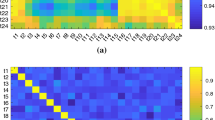Abstract
We present a new generic minimum cross-entropy method, called the semi-iterative MinxEnt, or simply SME, for rare-event probability estimation, counting, and approximation of the optimal solutions of a broad class of NP-hard linear integer and combinatorial optimization problems (COP’s). The main idea of our approach is to associate with each original problem an auxiliary single-constrained convex MinxEnt program of a special type, which has a closed-form solution. We prove that the optimal pdf obtained from the solution of such a specially designed MinxEnt program is a zero variance pdf, provided the “temperature” parameter is set to minus infinity. In addition we prove that the parametric pdf based on the product of marginals obtained from the optimal zero variance pdf coincides with the parametric pdf of the standard cross-entropy (CE) method. Thus, originally designed at the end of 1990s as a heuristics for estimation of rare-events and COP’s, CE has strong connection with MinxEnt, and thus, strong mathematical foundation. The crucial difference between the proposed SME method and the standard CE counterparts lies in their simulation-based versions: in the latter we always require to generate (via Monte Carlo) a sequence of tuples including the temperature parameter and the parameter vector in the optimal marginal pdf’s, while in the former we can fix in advance the temperature parameter (to be set to a large negative number) and then generate (via Monte Carlo) a sequence of parameter vectors of the optimal marginal pdf’s alone. In addition, in contrast to CE, neither the elite sample no the rarity parameter is needed in SME. As result, the proposed SME algorithm becomes simpler, faster and at least as accurate as the standard CE. Motivated by the SME method we introduce a new updating rule for the parameter vector in the parametric pdf of the CE program. We show that the CE algorithm based on the new updating rule, called the combined CE (CCE), is at least as fast and accurate as its standard CE and SME counterparts. We also found numerically that the variance minimization (VM)-based algorithms are the most robust ones. We, finally, demonstrate numerically that the proposed algorithms, and in particular the CCE one, allows accurate estimation of counting quantities up to the order of hundred of decision variables and hundreds of constraints.
Similar content being viewed by others
References
E. H. L. Aarts, and J. H. M. Korst, Simulated Annealing and Boltzmann Machines, Wiley, 1989.
S. Arora, E. Hazan, and S. Kale, The Multiplicative Weights Update Method: A Meta Algorith and Applications, Manuscript, Princeton University.
A. Ben-Tal, and M. Taboule, “Penalty functions and duality in stochastic programming via ϕ-divergence functionals,” Mathematics of Operations Reseach vol. 12(2) pp. 224–240, 1987.
Z. I. Botev, D. P. Kroese, and T. Taimre, “Generalized cross-entropy methods.” Proceedings of RESIM06 pp. 1–30, 2006.
T. M. Cover, and J. A. Thomas, Elements of Information Theory, Wiley, 1991.
A. Ghate, and R. L. Smith, “A dynamic programming approach to efficient sampling from Boltzmann distribution,” (accepted for publication)
T. Homem-de-Mello, “A study on the cross-entropy method for rare event probability estimation,” INFORMS Journal on Computing vol. 19(3) pp 381–394, 2007.
G. S. Fishman, Discrete Event Simulation: Modeling, Programming, and Analysis, Springer-Verlag, 2001.
J.N. Kapur, and H. K. Kesavan, Entropy Optimization with Applications, Academic, 1992.
R. Motwani, and R. Raghavan. Randomized Algorithms, Cambridge University Press, 1997.
M. A. Pincus, “A closed form selection of certain programming problems,” Operations Research vol. 16 pp. 690–694, 1968.
R. Y. Rubinstein, “Optimization of computer simulation models with rare events,” European Journal of Operations Research vol. 99 pp. 89–112, 1997.
R. Y. Rubinstein, “The cross-entropy method for combinatorial and continuous optimization,” Methodology and Computing in Applied Probability vol. 2 pp. 127–190, 1999.
R. Y. Rubinstein, “A stochastic minimum cross-entropy method for combinatorial optimization and rare-event estimation,” Methodology and Computing in Applied Probability vol. 1 pp. 1–46, 2005.
R. Y. Rubinstein, “How many needles are in a haystack, or how to solve #P-complete counting problems,” Methodology and Computing in Applied Probability vol. 1 pp. 1–42, 2007.
R. Y. Rubinstein, D. P. Kroese, A. Dolgin, and P. W. Glynn, “Parametric minimum cross-entropy method for counting the number of satisfiability assignments,” Manuscript, Technion, Israel.
R. Y. Rubinstein, and A. Shapiro, Discrete Event Systems: Sensitivity Analysis and Stochastic Optimization, Wiley, 1993.
R. Y. Rubinstein, and D. P. Kroese, The Cross-Entropy Method: a Unified Approach to Combinatorial Optimization, Monte-Carlo Simulation and Machine Learning, Springer, 2004.
R. Y. Rubinstein, and D. P. Kroese, Simulation and the Monte Carlo Method; Second Edition, Wiley, 2007.
A. Shapiro, “Stochastic Programming, Handbook in Operations Research and Management Science,” A. Ruszczynski and A. Shapiro (eds.), Elsevier, 2003.
L. A. Wolsey, Integer Programming, Wiley, 1998.
Author information
Authors and Affiliations
Corresponding author
Additional information
This research was supported by the Israel Science Foundation (grant No 191-565).
Rights and permissions
About this article
Cite this article
Rubinstein, R. Semi-Iterative Minimum Cross-Entropy Algorithms for Rare-Events, Counting, Combinatorial and Integer Programming. Methodol Comput Appl Probab 10, 121–178 (2008). https://doi.org/10.1007/s11009-007-9061-3
Received:
Revised:
Accepted:
Published:
Issue Date:
DOI: https://doi.org/10.1007/s11009-007-9061-3
Keywords
- Cross-entropy
- Boltzmann distribution
- Combinatorial optimization
- Rare events
- Counting problems
- Monte Carlo simulation




